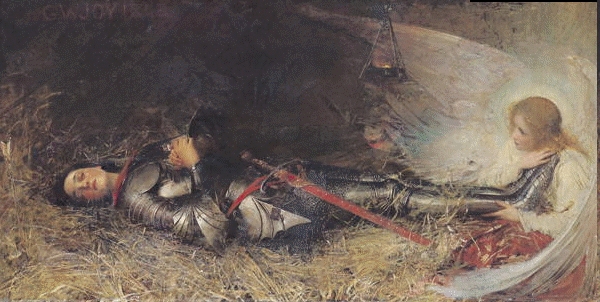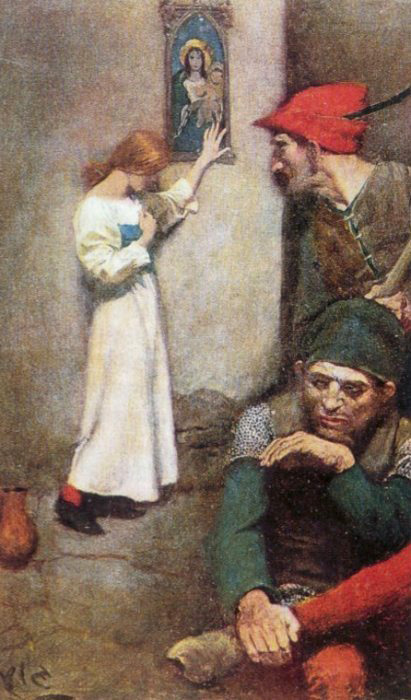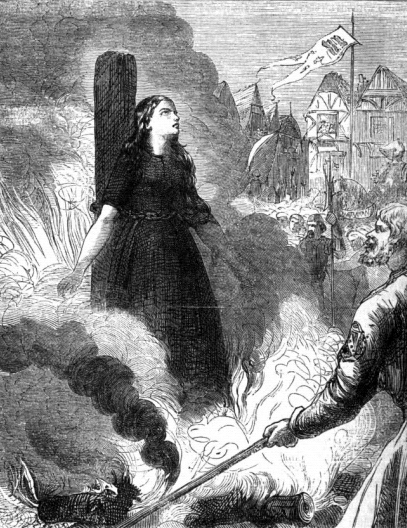| site search by freefind | advanced |
- Home
- History Stories
- Biographies of Famous People
- Joan of Arc Death
The Death Of
Joan Of Arc
By Anonymous
Note: If you purchase anything from links on this site, I may make a commission.
Join our Facebook page.
Read Joan Of Arc Part One and Part Two.
From there Joan of Arc rode to attack La Charite. But, though the towns helped her as well as they might with money and food, her force was too small and was too ill provided with everything, for the king did not send supplies. She abandoned the siege and departed in great displeasure. The court now moved from place to place, with Joan following in its train; for three weeks she stayed with a lady who describes her as very devout and constantly in church. Thinking her already a saint, people brought her things to touch.
"Touch them yourselves," she said; "your touch is as good as mine."
Captured
Winter was over and spring came on, but still the king did nothing. Joan of Arc could be idle no longer. Without a word to the king, she rode to Lagny, "for there they had fought bravely against the English." These men were Scots, under Sir Hugh Kennedy. In mid-April she was at Melun. There "she heard her Voices almost every day, and many a time they told her that she would presently be taken prisoner." Her year was over. She prayed that she might die as soon as she was taken, without the long sorrow of imprisonment. Then her Voices told her to bear graciously whatever befell her, for so it must be. But they told her not the hour of her captivity. "If she had known the hour she would not then have gone to war. And often she prayed them to tell her of that hour, but they did not answer." These words are Joan's. She spoke them to her judges at Rouen.
The name of Joan of Arc was now such a terror to the English that men deserted rather than face her in arms. At this time the truce with Burgundy ended, and the duke openly set out to besiege the strong town of Compiegne, held by De Flavy for France. Burgundy had invested Compiegne, when Joan, with four hundred men, rode into the town secretly at dawn. That day Joan led a sally against the Burgundians. Her Voices told her nothing, good or bad, she says. The Burgundians were encamped at Margny and at Clairoix, the English at Venette, villages on a plain near the walls. Joan crossed the bridge on a gray charger, in a surcoat of crimson silk, rode through the redoubt beyond the bridge, and attacked the Burgundians. De Flavy in the town was to prevent the English from attacking her in the rear. He had boats on the river to secure Joan's retreat, if necessary.
Joan of Arc swept through Margny driving the Burgundians before her; the garrison of Clairoix came to their help; the battle was doubtful. Meanwhile the English came up; they could not have reached the Burgundians, to aid them, but some of the Maid's men, seeing the English standards, fled. The English followed them under the walls of Compiegne; the gate of the redoubt was closed to prevent the English from entering with the runaways. Like Hector under Troy, the Maid was shut out from the town which she came to save.
Joan was with her own foremost line when the rear fled. They told her of her danger; she heeded not. Her men seized her bridle and turned her horse's head about. The English held the entrance from the causeway; Joan and a few men were driven into a corner of the outer wall. A rush was made at Joan. "Yield! yield to me!" each man cried.
Joan was with her own foremost line when the rear fled. They told her of her danger; she heeded not. Her men seized her bridle and turned her horse's head about. The English held the entrance from the causeway; Joan and a few men were driven into a corner of the outer wall. A rush was made at Joan. "Yield! yield to me!" each man cried.
"I have given my faith to Another," she said, "and I will keep my oath."
Her enemies confess that on this day Joan did great feats of arms, covering the rear of her force when they had to fly. Some French historians hold that the gates were closed, by treason, that the Maid might be taken.
The Maid, as a prisoner, was led to Margny, where the Burgundian and English captains rejoiced over her. They had her at last, the girl who had driven them from fort and field. Not a French lance was raised to rescue her; not a sou did the king send to ransom her.
The Trial

Within two days of her capture, the Vicar-General of the Inquisition in France claimed her as a heretic and a witch. The English knights let the doctors of the University of Paris judge and burn the girl whom they seldom dared to face in war. She was the enemy of the English, and the English believed in witchcraft. Joan was now kept in a high tower and was allowed to walk on the leads. She knew she was sold to England, she had heard that the people of Compiegne were to be massacred. She would rather die than fall into English hands, but she hoped to escape and relieve Compiegne. She therefore prayed for counsel to her Saints; might she leap from the top of the tower? Would they not bear her up in their hands? St. Catherine bade her not to leap; God would help her and the people of Compiegne.
Then, for the first time, as far as we know, the Maid wilfully disobeyed her Voices. She leaped from the tower. They found her, not wounded, not a limb broken, but stunned. She knew not what had happened; they told her she had leaped down. For three days she could not eat, "yet was she comforted by St. Catherine, who bade her confess and seek pardon of God, and told her that, without fail, they of Compiegne should be relieved before Martinmas." This prophecy was fulfilled. Joan was more troubled about Compiegne than about her own coming doom.

Joan of Arc was now locked up in an iron cage at Rouen. The person who conducted the trial was her deadly enemy, the Bishop of Beauvais, Cauchon, whom she and her men had turned out of his bishopric. Next, Joan was kept in strong irons day and night, always guarded by five English soldiers. Weakened by long captivity and ill usage, she, an untaught girl, was questioned repeatedly for three months by the most cunning and learned doctors of law of the Paris University. Often many spoke at once, to perplex her mind. But Joan always showed a wisdom which confounded them, and which is at least as extraordinary as her skill in war. She would never swear an oath to answer all their questions. About herself, and all matters bearing on her own conduct, she would answer. About the king, and the secrets of the king, she would not answer. If they forced her to reply about these things, she frankly said, she would not tell them the truth. The whole object of the trial was to prove that she dealt with powers of evil, and that her king had been crowned and aided by the devil. Her examiners, therefore, attacked her day by day, in public and in her dungeon, with questions about these visions which she held sacred and could only speak of with a blush among her friends. She maintained that she certainly did see and hear her Saints, and that they came to her by the will of God. This was called blasphemy and witchcraft.
Most was made of her refusal to wear woman's dress. For this she seems to have had two reasons: first, that to give up her old dress would have been to acknowledge that her mission was ended; next, for reasons of modesty, she being alone in prison among ruffianly men. She would wear woman's dress if they would let her take the Holy Communion, but this they refused. To these points she was constant: she would not deny her visions; she would not say one word against her king, "the noblest Christian in the world" she called him, who had deserted her. She would not wear woman's dress in prison. They took her to the torture-chamber, and threatened her with torture. Finally, they put her up in public, opposite a pile of wood ready for burning, where she was solemnly preached to for the last time. All through her trial, her Voices bade her answer boldly, in three months she would give her last answer, in three months "she would be free with great victory, and come into the Kingdom of Paradise."
Fear-Induced Confession
At last, in fear of the fire and the stake before Joan of Arc, and on promise of being taken to a kindlier prison among women, and released from chains, she promised to renounce her visions, and submit to Cauchon and her other enemies. Some little note on paper she now signed with a cross, and repeated a short form of words. By some trick this signature was changed for a long document, in which she was made to confess all her visions false.
Cauchon had triumphed. The blame of heresy and witchcraft was cast on Joan, and on her king as an accomplice. But the English were not satisfied; they made an uproar, they threatened Cauchon, for Joan's life was to be spared. She was to be in prison all her days, on bread and water, but while she lived they dared scarcely stir against the French. They were soon satisfied.
Joan's prison was not changed. There soon came news that she had put on man's dress again. The judges went to her. She told them (they say) that she put on this dress of her own free will. In confession, later, she told her priest that she had been refused any other dress, and had been brutally treated both by the soldiers and by an English lord.
In any case, the promises made to her had been broken. The judge asked her if her Voices had been with her again.
"Yes."
"What did they say?"
"God told me by the Voices of the great sorrow of my treason, when I abjured to save my life."
"Do you believe the Voices came from St. Margaret and St. Catherine?"
"Yes, and that they are from God."
She added that she had never meant to deny this, had not understood that she had denied it.
Death Of Joan Of Arc

All was over now; she was a "relapsed heretic."
Enough. They burned Joan the Maid. She did not suffer long. Her eyes were fixed on a cross which a priest, Martin l'Advenu, held up before her. She maintained, he says, to her dying moment, the truth of her Voices. With a great cry of JESUS! she gave up her life. Even the English wept, even a secretary of the English king said that they had burned a Saint.
Twenty years after her death Charles VII, in his own interest, induced the Pope to try the case of Joan over again. They collected the evidence of most of the living people who had known her, the Domremy peasants, from Dunois, d'Alencon, d'Aulon, from Isambart and l'Advenu, they learned how nobly she died, and how she never made one complaint, but forgave all her enemies freely. All these old Latin documents were collected, edited, and printed, in 1849, by Monsieur Jules Quicherat, a long and noble labor.



